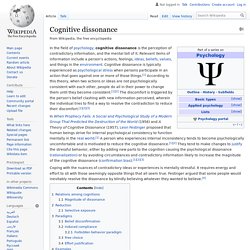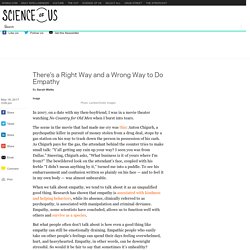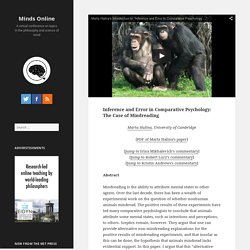

Cognitive dissonance - Wikipedia. Psychological stress resulting from multiple contradictory beliefs, ideas, or values held at the same time Coping with the nuances of contradictory ideas or experiences is mentally stressful.

It requires energy and effort to sit with those seemingly opposite things that all seem true. Festinger argued that some people would inevitably resolve dissonance by blindly believing whatever they wanted to believe. Relations among cognitions[edit] To function in the reality of society, human beings continually adjust the correspondence of their mental attitudes and personal actions; such continual adjustments, between cognition and action, result in one of three relationships with reality:[2] Magnitude of dissonance[edit] The term "magnitude of dissonance" refers to the level of discomfort caused to the person. The Feeling of Empathy: What's Right & Wrong. In 2007, on a date with my then-boyfriend, I was in a movie theater watching No Country for Old Men when I burst into tears.

The scene in the movie that had made me cry was this: Anton Chigurh, a psychopathic killer in pursuit of money stolen from a drug deal, stops by a gas station on his way to track down the person in possession of his cash. As Chigurh pays for the gas, the attendant behind the counter tries to make small talk: “Y’all getting any rain up your way? I seen you was from Dallas.” Sneering, Chigurh asks, “What business is it of yours where I’m from?” The bewildered look on the attendant’s face, coupled with his feeble “I didn’t mean anything by it,” turned me into a puddle.
When we talk about empathy, we tend to talk about it as an unqualified good thing. Theconversation. From believing that clouds are alien spaceships to thinking that MI6 agents are following you in unmarked cars, delusions are the hallmark of severe mental illness.

Even psychologists and psychiatrists who work with delusional patients remain puzzled about why someone can possibly hold such beliefs when the evidence is clearly contradictory. And if we can’t really understand them, how are we supposed to help? For example, could it be that delusions are really just extreme perceptual illusions – the cloud really looks like a spaceship?
In this case, the explanation would be completely rational. Or does a delusional belief result from a breakdown in rationality, whereby the person has the correct evidence but draws the wrong conclusions? People-prone-to-this-emotion-are-better-at-reading-facial-expression. Some good can come of this emotion — not so much its close cousin, shame.

People who are more prone to feeling guilt are better at reading other people’s emotions, a new study finds. The guilt-prone were able to read all types of facial emotions better, tests revealed. They were particularly good on relatively low-intensity emotions. Subtle facial expressions are (obviously) the most difficult to detect.
This is not the first time guilt has been linked to empathy, as the study’s authors explain: “[there is] a large body of prior research linking guilt-proneness with an enhanced capacity for empathy as assessed by self-report and as well as theory suggesting that guilt and empathic perspective taking operate synergistically following interpersonal transgressions.” An Important but Rarely Discussed Lesson of the Stanford Prison Experiment - Beautiful Minds - Scientific American Blog Network. Any man can withstand adversity; if you want to test his character, give him power. — Abraham Lincoln I recently watched the movie adaptation of the Stanford Prison Experiment.

Like most reviewers, I found it harrowing. But as a psychologist, I also found it revealing. With my eyes glued to the screen in rapt attention, heart racing, I became obsessed with understanding what really was going on, and the lessons we can glean from such an experiment gone so horribly wrong. The standard story, given by the experimenter Phillip Zimbardo, is that the experiment is a lesson about how everyday people (and groups consisting of everyday people), when given too much power, can become sadistic tyrants. While this is certainly a valuable lesson, I believe another crucial variable at play that is rarely mentioned by commentators of the prison experiment or even in psychology textbooks is the person.
Inference and Error in Comparative Psychology: The Case of Mindreading. Marta Halina, University of Cambridge [PDF of Marta Halina’s paper] [Jump to Irina Mikhalevich’s commentary] [Jump to Robert Lurz’s commentary] [Jump to Kristin Andrews’s commentary] Abstract Mindreading is the ability to attribute mental states to other agents.

Over the last decade, there has been a wealth of experimental work on the question of whether nonhuman animals mindread. 1. Mindreading is the ability to attribute mental states to other agents. Psychologists and philosophers have been pursuing the question of whether nonhuman animals (hereafter, animals) mindread for over 35 years (Premack and Woodruff 1978). The “alternative-hypothesis objection” is central to the critique advanced by the sceptics.[3] This objection holds that if an alternative non-mindreading hypothesis can account for the results of a mindreading experiment, then those results do not in fact provide good evidence for mindreading. 2. 3. Penn and Povinelli (2007) represent a clear example of this argument.